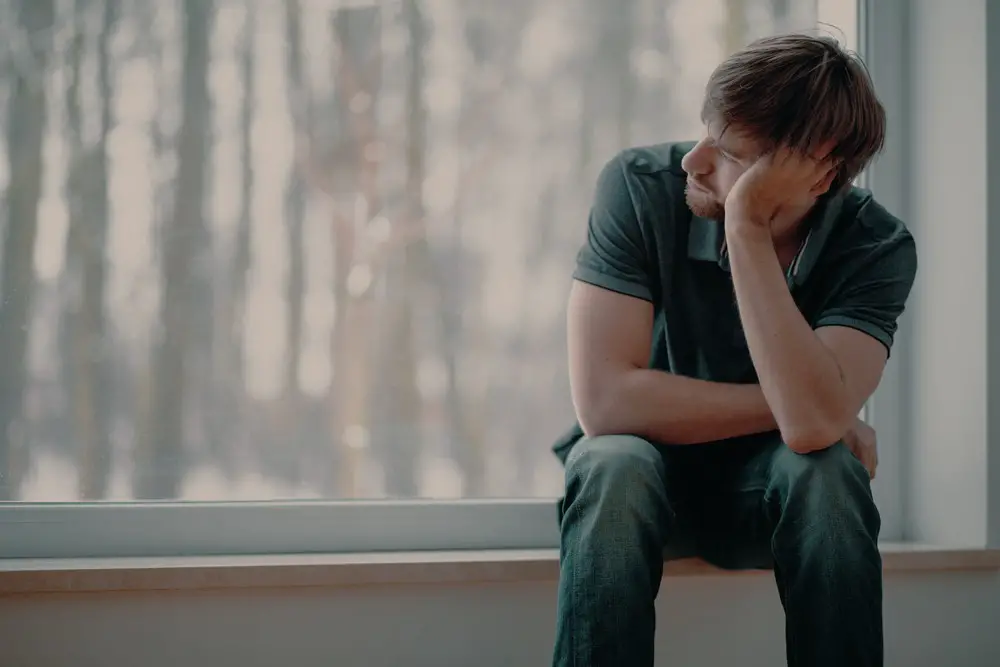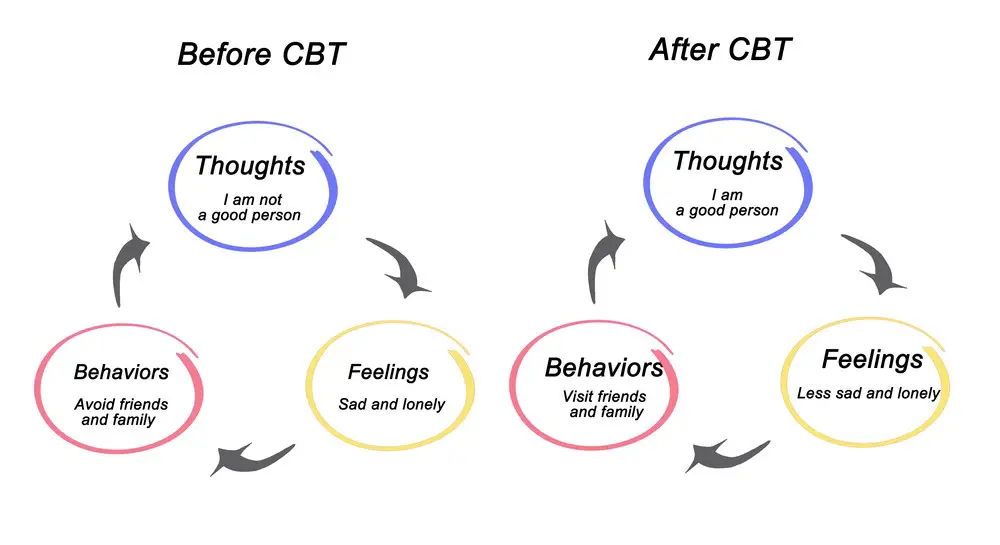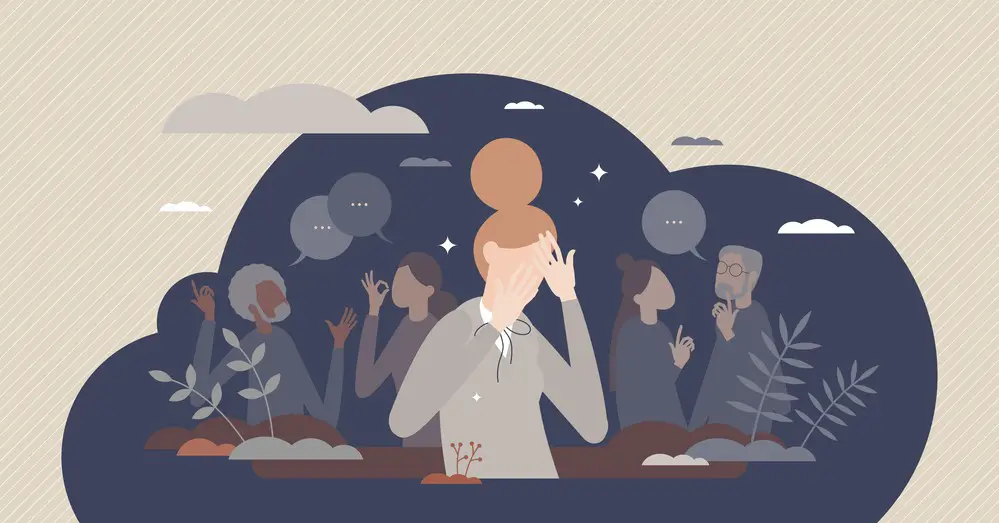As a BetterHelp affiliate, we receive compensation from BetterHelp if you purchase products or services through the links provided
Social anxiety is a common mental health issue that affects millions of people worldwide, and it can significantly impact one’s relationships. It is characterized by an intense fear of being judged, negatively evaluated, or rejected in social situations, leading to avoidance of social interactions or enduring them with extreme discomfort. For individuals with social anxiety, navigating the complexities of romantic and platonic relationships can be particularly challenging.
Establishing and maintaining meaningful connections is essential for one’s well-being, and those with social anxiety often struggle to initiate and engage in these interactions. This struggle can result in loneliness, low self-esteem, and a limited support network. Communication is key in any relationship, and the fear of judgment or rejection inhibits honest and open dialogue for those experiencing social anxiety, further complicating matters.
In this article, we will explore how social anxiety impacts relationships, discuss strategies for overcoming these challenges, and provide resources for individuals and their loved ones to understand better this often misunderstood condition. It is important to remember that while social anxiety can be daunting, it does not have to define one’s relationships or deprive them of the opportunity for connection and growth.
Understanding Social Anxiety

Causes of Social Anxiety
Social anxiety, also known as social phobia, is an anxiety disorder characterized by persistent fear and discomfort in social situations. It often stems from a combination of genetic and environmental factors. People with social anxiety may be more prone to feeling intense emotions, like fear and shyness, when faced with social situations.
Some common causes of social anxiety include:
- Family history: Individuals with relatives who have social anxiety or other anxiety disorders may be more likely to develop social anxiety themselves.
- Childhood experiences: Negative or traumatic social experiences, such as bullying or rejection, can contribute to the development of social anxiety.
- Temperament: People with an introverted or shy temperament may be more likely to experience social anxiety.
- Brain structure: Research suggests that differences in the amygdala, an area of the brain associated with fear, may play a role in social anxiety.
Symptoms of Social Anxiety
People with social anxiety often experience various symptoms when faced with social situations. These symptoms can be both emotional and physical and may include:
- Intense fear or worry about social situations
- Avoidance of social events or gatherings
- Difficulty meeting new people or starting conversations
- Rapid heartbeat, sweating, or blushing in social situations
- Diminished eye contact and body language that displays discomfort
- Feeling nauseous or experiencing stomach discomfort
- Ruminating on past social experiences, often negatively
- Fear of being judged, embarrassed, or humiliated in front of others
Recognizing these symptoms can help individuals better understand their social anxiety and seek appropriate treatment or support.

Social Anxiety in Relationships
Romantic Relationships
Social anxiety can have a significant impact on romantic relationships. Individuals with social anxiety may struggle to initiate conversations, express their feelings, or make a commitment. This can lead to a lack of trust in their partner, making it difficult to maintain a healthy relationship.
Intimate Relationships
Intimate relationships often require a certain level of vulnerability and trust. Social anxiety can interfere with forming intimate connections due to the fear of being judged or rejected. Consequently, the individual may avoid situations that involve high levels of emotional closeness, ultimately affecting the growth and depth of the relationship.
Friendships
Making and maintaining friendships can be challenging for people with social anxiety. While forming new connections may involve conversations and social interactions, social anxiety may hinder the individual’s ability to engage in such exchanges. This fear of judgment and rejection can lead to isolation and withdrawal, making it difficult for the individual to form a strong support network.
Splitting text into several paragraphs, utilizing bullet points and tables when needed, each subsection of this section has provided clear and concise information on the impact of social anxiety on different types of relationships, ensuring it is easily readable and informative.
Impact on Communication and Connection
Communication Challenges
Social anxiety affects various aspects of communication, such as initiating conversations, maintaining eye contact, or interpreting non-verbal cues. This can lead to misunderstandings, difficulty forming bonds, and feelings of isolation. It can impact individuals’ confidence in expressing their thoughts and feelings due to fear of rejection and criticism during interactions, making others perceive them as distant or uninterested.
Self-Disclosure
A critical component of building intimacy in relationships is self-disclosure, which refers to sharing one’s thoughts, feelings, and experiences with others. Social anxiety can hinder this process, as individuals may be reluctant to open up about themselves due to heightened sensitivity to criticism. This can result in a lack of depth in relationships, making it difficult for people with social anxiety to connect with others on a deeper level.
Social Skills
Individuals with social anxiety often face challenges in developing and employing effective social skills. This can lead to a variety of struggles in relationships, including:
- Difficulty initiating and maintaining conversations
- Limited ability to interpret and respond to social cues
- Struggles with asserting one’s needs and boundaries
Despite social anxiety’s obstacles, it is essential to remember that individuals with this condition can build meaningful, fulfilling relationships. By acknowledging the communication and social skill challenges they face, people with social anxiety can begin to address their concerns and work towards improving their connectedness and intimacy with others.

Effects of Social Anxiety on Relationship Satisfaction
Social anxiety is a common mental health concern impacting various aspects of life, including relationships. People with social anxiety may experience difficulties in forming and maintaining close connections due to fear of judgment, rejection, or embarrassment in social situations. This section explores the effects of social anxiety on relationship satisfaction, social support and how it can lead to lower satisfaction in relationships.
The experience of social anxiety can create a barrier to building and maintaining fulfilling romantic relationships. Individuals with social anxiety often avoid social situations or experience significant distress when faced with the possibility of interacting with others, which may reduce opportunities to form connections. This self-imposed isolation and reduced openness to new connections can contribute to lower relationship satisfaction, as the person may struggle to establish or deepen connections with their partner.
In addition to reduced opportunities to form connections, social anxiety may impede social support development within relationships. Social support is crucial for fostering a healthy and satisfying romantic relationship. Still, those with social anxiety may feel they cannot discuss their feelings with their partner, fearing judgment or misunderstanding. This lack of open communication can lead to a sense of emotional distance, further lowering the sense of satisfaction in the relationship.
Moreover, individuals with social anxiety might perceive their relationships as less supportive or fulfilling, even if their partner is trying to provide emotional support. Due to social anxiety, these individuals may have distorted perceptions of their relationships, feeling that their partners are not understanding or supportive enough, even if this is not the case.
It is essential to recognize the impacts of social anxiety on relationship satisfaction and the importance of seeking help to overcome these challenges. By addressing social anxiety and improving communication and openness with a partner, relationship satisfaction may be bolstered, and the negative effects of social anxiety on romantic relationships can be mitigated.
Social Anxiety in Various Life Areas
Work and School
Social anxiety can significantly impact an individual’s ability to succeed in work and school environments. It may cause them to struggle with tasks that involve public speaking, group projects, or interacting with peers and supervisors. Symptoms such as excessive blushing, trembling, or avoidance behaviors can make it challenging for people with social anxiety to form connections, leading to feelings of isolation.
Online Dating
The prevalence of online dating has opened new opportunities for people with social anxiety. While it may initially appear to be a safe and less intimidating way to build connections, it can present its challenges. The pressure to make a positive first impression and fear of rejection can heighten anxiety symptoms. Additionally, the expectation of eventually transitioning from online to in-person meetings can add to the stress.
Mental Health
Social anxiety often affects an individual’s overall mental health, contributing to feelings of loneliness, depression, and low self-esteem. Managing the symptoms and coping with the daily struggles may become taxing, leading to an increased risk of developing additional mental health issues. Seeking professional help through therapy, support groups, or medication can significantly improve their mental well-being.
Quality of Life
When social anxiety hinders an individual’s ability to form relationships or excel in work and school, it also impacts their quality of life. Personal and professional growth may be stifled, causing them to miss opportunities for advancement or enjoyable experiences. Addressing social anxiety through treatments like cognitive behavioral therapy or pharmaceutical interventions can help improve one’s overall quality of life.
Treatment for Social Anxiety

Cognitive Behavioral Therapy
Cognitive Behavioral Therapy (CBT) is a common form of psychotherapy that focuses on changing negative patterns of thought and behavior. It has been proven effective in treating Social Anxiety Disorder (SAD). During CBT, therapists help patients identify and reframe their negative thoughts and beliefs to understand their social anxiety triggers better and develop healthier coping mechanisms.
The treatment process usually includes:
- Identifying and addressing irrational beliefs
- Developing personalized goals and action plans
- Practicing relaxation techniques
- Participating in simulated social situations
Exposure Therapy
Exposure therapy is another effective method for treating SAD. It involves gradually exposing patients to feared social situations so they can learn to tolerate anxiety and build confidence. The goal is to reduce avoidance behaviors, allowing individuals to engage in social situations without excessive fear.
Steps in exposure therapy include:
- Identifying feared social situations
- Ranking them in order of difficulty
- Gradually facing each situation while practicing anxiety-reduction techniques
- Reflecting on progress and updating goals
This method can be combined with CBT to form a comprehensive treatment plan.
Medications
In some cases, medications may be prescribed to help manage symptoms of social anxiety. Selective serotonin reuptake inhibitors (SSRIs), such as fluoxetine and sertraline, are often the first line of treatment. Other options include benzodiazepines, beta-blockers, and monoamine oxidase inhibitors (MAOIs). Working closely with a healthcare provider is crucial to find the right medication and dosage.
To summarize, treatments for Social Anxiety include Cognitive Behavioral Therapy, Exposure Therapy, and medications. It’s essential for individuals undergoing treatment to have a customized plan based on their specific needs and goals. Combining different treatment methods can often lead to the best outcomes for those struggling with social anxiety.
Seeking Professional Help
When an individual experiences persistent anxiety symptoms and significant distress in their relationships, it may be time to seek professional help. A mental health professional can assess the severity of the issue and guide on coping mechanisms and treatment options.
Several types of mental health professionals can offer assistance, including:
- Doctors can rule out any underlying medical conditions and provide medication if needed.
- Clinicians, such as psychologists or therapists, specialize in anxiety disorders and can offer tailored therapy sessions to address the specific needs of the individual.
It’s important to find a mental health professional that the individual feels comfortable with, as a strong therapeutic relationship can improve the effectiveness of treatment. Some factors to consider when choosing a provider include their experience in treating social anxiety, their therapeutic approach, and availability.
Treatment options for social anxiety in relationships may include:
- Cognitive-behavioral therapy (CBT), is a short-term, goal-oriented therapy that focuses on identifying and changing negative thought patterns and behaviors.
- Medication, such as selective serotonin reuptake inhibitors (SSRIs) or benzodiazepines, can help manage anxiety symptoms.
Groups, such as support groups, invite meaningful conversations between people suffering from social anxiety, which can lead to useful insights and advice.
Early intervention for social anxiety in relationships can lead to better overall mental health and improved relationship satisfaction. Seeking professional help is a critical step toward managing and overcoming the challenges associated with social anxiety in interpersonal connections.
FAQs
What are the common signs of social anxiety?
Some common signs of social anxiety include:
- Excessive sweating
- Rapid heartbeat
- Blushing
- Difficulty speaking
- Fear of being judged
- Avoidance of social situations
How does social anxiety affect relationships?
Social anxiety can make it difficult for a person to:
- Establish new relationships
- Maintain existing relationships
- Communicate effectively
- Show affection and support
- Attend social events together
What can people do to manage their social anxiety while in a relationship?
People can try the following strategies:
- Open communication: Share their feelings and concerns with their partner.
- Professional help: Seek therapy or support from a mental health professional.
- Practice exposure: Gradually face anxiety-provoking situations together.
- Develop coping strategies: Learn relaxation techniques or mindfulness practices.
- Be patient and understanding: It takes time to overcome social anxiety.
Can both partners in a relationship experience social anxiety?
Yes, both partners can experience social anxiety. Supporting and encouraging each other in addressing and managing anxiety is crucial. Communicating openly, seeking professional help, and practicing exposure can be helpful in such relationships.
Do people with social anxiety have successful relationships?
Yes, people with social anxiety can have successful relationships. Couples can build strong, trusting, and supportive partnerships by understanding and addressing their anxiety. However, it may require patience, open communication, and professional help as necessary.
- Stress Management: What is the Relationship Between Stress and Addiction? - June 28, 2024
- Exploring Techniques to Maintain a Healthy Lifestyle without Drugs - May 28, 2024
- How Acupuncture Helps Treat Chronic Fatigue Syndrome - May 28, 2024
This site contains affiliate links to products. We will receive a commission for purchases made through these links.




